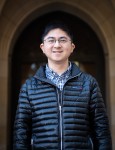At 18 months old, Derek Lee was diagnosed with cancer. Six months of chemotherapy and radiation treatments saved his life, but left him with profound hearing loss that led him to get a cochlear implant.
Lee, who is pursuing a master’s degree in public health at UCLA, will be awarded the Cochlear Americas Graeme Clark Scholarship this week for his dedication to making the most out of his experience with the Cochlear Nucleus Implant.
The scholarship, which is awarded to five cochlear implant recipients annually, grants awardees $2,000 per year for up to four years at an accredited college or university.
Lee said his cancer treatments, which finished in 1997, damaged his inner ear.
“The medication they gave me destroyed a lot of the hair cells in my cochlea,” he said. “Cochlear hair cells rely on their flexibility to function, and basically my treatment made them stiffen up.”
Lee used traditional hearing aids in both ears until he made the decision to get a cochlear implant in his left ear during his second year at Stanford University, due to concerns that he was missing out on the social experiences of college.
“I grew up with hearing aids but … I wasn’t able to hear that well. We lived in dorms at Stanford and I couldn’t hear stuff from across the hall,” he said. “I decided that I was missing out on interactions with my fellow peers, so I made the decision to get the implant.”
Lee said he decided to keep his hearing aid in his right ear to preserve the acoustic hearing necessary to continue playing music. He also added originally he was not sure whether he should get the cochlear implant in his left ear because it would make it more difficult to get an MRI scan if his cancer returned.
“Ideally I would be more available to getting MRIs, as they are the best imaging technology possible. With a cochlear implant, you can get an MRI, but you have to undergo surgery to remove the magnetic portion first,” he said. “I’ve been relatively healthy for 22 years – I had to take a leap of faith.”
Lee says he thinks providing an honest perspective on the challenges that come with the implant on his scholarship application helped him win the scholarship.
“One big misconception that people have is that they think (the cochlear implant) is a silver bullet for everything. Once you get implanted, it’s not like everything is perfect,” he said. “There’s a huge improvement in how much I can hear, but I still struggle. … You have to go through this phase where you have to train your brain.”
Lee said he overcoming challenges in the past has given him the strength to adjust to the cochlear implant.
“The cochlear implant replaces the functionality of the cochlear hair cells using electrodes. You’re changing from the natural system to a more artificial system. That training process is long and you have to persevere,” he said. “I tied that to the idea that there are always going to be big challenges, but looking back to how I trained my ear to overcome those challenges, it gives me hope that I can overcome these too.”
Juhyun Kim, a biostatistics graduate student who attends the same church as Lee, said she learned about Lee’s implant after they became friends.
“He’s very honest about his health, and he’s not self-conscious about it,” Kim said. “It’s not like the elephant in the room, he talks about it,” she said.
Kim said she was impressed by Lee’s drive last quarter.
“He’s not defined by his challenges, … he’s very confident. I mean first quarter he was already applying for jobs,” she said. “I thought that was very impressive.”
Catherine Crespi, a biostatistics professor and Lee’s advisor, said she has also noticed Lee’s confidence.
“He seems like a very fearless person; he doesn’t have the kind of hesitation to try new things or put himself out there the way other people might have,” she said. “He’ll just forge ahead.”
Crespi said Lee’s decision to take her biostatistics course is indicative of this fearlessness, as her course is designed for students pursuing a Master of Science degree and is therefore more mathematically challenging than the Master of Public Health courses.
“The course that he’s in right now is a challenge,” she said. “He’s the only MPH student who’s in that class right now, … which I think speaks to his desire to challenge himself.”
Lee said that he relies on an FM radio system during lectures to better understand his professors, as well as captioning services provided by the UCLA Center for Accessible Education.
“I rely a lot on looking at the professor’s mouth and lip-reading, but when I’m also looking at slides, my head’s going in a million different directions,” he said. “Having that backup really allows me to make sure I’m getting all the information.”
Lee said he is planning on paying for graduate school without help from his family, using money from the scholarship.
“It’s an opportunity for me to pursue that independence the implant has given me. Knowing that I was almost close to losing my life with my cancer gave me perspective,” he said. “The visibility that comes with the award is an opportunity for me to share my story of how the cochlear implant has helped me.”
Lee said he tries to live life without regret despite the challenges that come his way.
“At the end of the day, if my life were to end tomorrow, would it have been worth living? Have I contributed to society?” Lee said. “Have I been a positive influence among my friends?”
